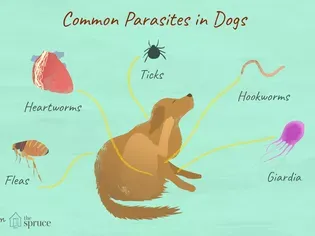Parasites in Dogs You Should Know
Updated on 04/26/24

Parasites in Dogs You Should Know
As a dog owner, it's crucial to be aware of the potential parasites that can plague your furry companion. These unwelcome guests can cause a range of health issues, from mild discomfort to life-threatening conditions. In this comprehensive guide, we will delve into the most common parasites that can affect dogs and provide you with essential information to keep your beloved pet safe and healthy.
Internal Parasites
1. Roundworms
Roundworms are intestinal parasites that are commonly found in puppies and young dogs. Infection occurs when dogs ingest larvae present in contaminated soil, water, or food, or through contact with infected feces. Roundworms can cause symptoms such as vomiting, diarrhea, weight loss, and a pot-bellied appearance.
2. Hookworms
Hookworms are another type of intestinal parasite that can infect dogs of all ages. They attach to the lining of the small intestine and feed on the host's blood, leading to anemia and weakness. Common symptoms of hookworm infection include bloody diarrhea, weight loss, and lethargy.
3. Tapeworms
Tapeworms are flat, segmented parasites that live in the dog's small intestine. Dogs become infected by ingesting infected fleas or eating small rodents that carry tapeworm larvae. Tapeworm segments, which resemble grains of rice, can be seen in the dog's feces or around the肛门区域.
4. Whipworms
Whipworms are slender, whip-like parasites that reside in the large intestine. Infection occurs through ingestion of whipworm eggs present in contaminated soil or water. While symptoms are often mild, chronic infection can lead to weight loss, diarrhea, and straining during defecation.
External Parasites
1. Fleas
Fleas are tiny, wingless insects that feed on the blood of animals and humans. They can cause intense itching, skin irritation, and allergic reactions. Fleas can also transmit diseases such as tapeworms and Bartonella infections.
2. Ticks
Ticks are external parasites that attach themselves to the skin of dogs and feed on their blood. They can transmit a variety of diseases, including Lyme disease, Rocky Mountain spotted fever, and ehrlichiosis.
3. Mange Mites
Mange mites are microscopic parasites that infest the skin of dogs. They cause intense itching, hair loss, and skin irritation. There are two main types of mange mites: sarcoptic mange, which is highly contagious and causes severe skin lesions, and demodectic mange, which is less contagious and often affects puppies or dogs with weakened immune systems.
4. Ringworms
Ringworms are fungal infections that can affect the skin, nails, and hair of dogs. They cause circular, itchy lesions that resemble rings. Ringworms are highly contagious and can be spread through contact with infected animals or contaminated environments.
Signs and Symptoms of Parasitic Infection
Recognizing the signs and symptoms of parasitic infection is crucial for early detection and treatment. Here are some common indicators:
* Gastrointestinal issues: Vomiting, diarrhea, weight loss, loss of appetite, pot-bellied appearance
* Skin problems: Itching, hair loss, skin irritation, lesions, crusty patches
* Lethargy, weakness, and anemia
* Pale gums
* Visible parasites: Worms or segments in feces, fleas on skin or coat
* Straining during defecation
* Swollen lymph nodes
* Neurological symptoms: Seizures, tremors
Diagnosing Parasitic Infection
If you suspect your dog may have a parasitic infection, it's important to seek veterinary attention promptly. Your veterinarian will perform a physical examination, review your dog's history, and may order diagnostic tests such as:
* Fecal examination: To detect eggs or cysts of intestinal parasites
* Blood test: To check for anemia and detect antibodies against specific parasites
* Skin scraping: To identify mites or fungal infections
* Radiographs (X-rays): To assess the extent of parasitic infection
Treatment and Prevention
Treatment for parasitic infections will vary depending on the type of parasite involved. Common treatments include:
* Anthelmintics (dewormers): To kill intestinal parasites
* Topical or oral medications: To eliminate external parasites
* Antibiotics: To treat bacterial infections caused by parasites
* Shampoos and dips: To kill parasites on the skin and coat
* Regular fecal examinations and parasite control measures
Preventing parasitic infections is essential for maintaining your dog's health. Here are some preventive measures:
* Regular deworming: Follow your veterinarian's recommended deworming schedule
* Flea and tick control: Use topical or oral flea and tick preventatives, and inspect your dog for external parasites regularly
* Clean living environment: Keep your dog's living area clean and free of feces
* Avoid contact with infected animals: Limit your dog's interaction with stray animals or dogs known to have parasites
* Wash hands thoroughly: Wash your hands after handling your dog or cleaning up after them
* Consult your veterinarian: Seek veterinary advice on the best parasite prevention methods for your dog
Conclusion
Parasites can pose a significant threat to your dog's health and well-being. By understanding the different types of parasites, recognizing the signs and symptoms of infection, and following preventive measures, you can help protect your furry companion from these unwelcome guests. Regular veterinary check-ups and adherence to recommended parasite control programs are crucial for maintaining your dog's health and ensuring a long, happy life together.
Explore More Pets

Basic Training
Puppy and Baby Introductions

Working Dog Breeds
All About Search and Rescue Dogs

Dog Treatments
Puppy Vaginitis: Signs, Causes and Treatment

Dog Adoption
After More Than 1,200 Days in the Shelter, Coco Goes Home

Basic Training
How to Train Your Puppy to Go on Potty Pads

Hybrid Dog Breeds
The Difference Between a Mutt, Mixed Breed, or Designer Dog?

Dog Treatments
Nail Problems in Dogs

Puppies
7 Reasons Why Two Dogs Are Better Than One